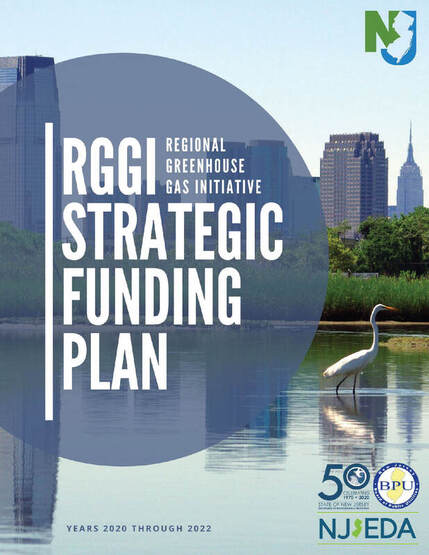 New Jersey plans to use money from a regional plan to reduce greenhouse gas pollution to fund clean energy projects, protect the health of citizens and prepare coastal communities to better weather future storms and rising seas, according to a Friday, April 17 announcement by Gov. Phil Murphy. The Department of Environmental Protection (DEP), Board of Public Utilities (BPU) and Economic Development Authority (EDA) released a strategic funding plan for investing the state’s auction proceeds from the Regional Greenhouse Gas Initiative (RGGI), the cap-and-trade pact among northeastern states dedicated to reducing greenhouse gas emissions from the electricity generating sector. New Jersey plans to invest an estimated $80 million each year in programs that reduce greenhouse gas emissions, drive forward projects that boost clean energy and create jobs, protect the health of residents in environmental justice communities and increase the resiliency of coastal communities. New Jersey’s renewed participation in RGGI and the investment of proceeds into the clean energy economy and climate change mitigation are key components of the Murphy Administration’s interconnected environmental and economic development goals. In addition, funds from the RGGI auctions will be heavily dedicated to projects that will benefit the state’s environmental justice communities. The American Littoral Society applauds the governor's action, which comes in part through the Global Warming Solutions Act, which the Society helped craft more than a decade ago. “The Murphy administration’s release of the RGGI Strategic Funding plan provides another tool for our efforts to protect New Jersey from the impacts of climate change," said Tim Dillingham, Executive Director for the American Littoral Society. "Funding for Blue Carbon sequestration projects will help remove greenhouse gases, help restore important coastal habitats such as tidal marshes, and build buffers against future storms.”
As required by the Global Warming Response Act, the EDA will be responsible for allocating 60 percent of the auction proceeds to qualified projects, and the DEP and BPU will each be responsible for allocating 20 percent. Under Governor Murphy’s leadership, New Jersey formally rejoined RGGI this year, after two years of reentry negotiations and rulemaking led by Department of Environmental Protection Commissioner Catherine R. McCabe. In March, the state participated in its first quarterly carbon dioxide (CO2) allowance auction since rejoining, realizing more than $20 million in proceeds. “The RGGI Strategic Funding Plan demonstrates how our state agencies collaborate to help create a brighter future for all New Jerseyans, especially our environmental justice communities,” said Governor Murphy. “As our State responds to COVID-19, we see up close the vital link between public health and economic development, the same relationship that drives our Administration’s efforts to reduce health risks from pollution and climate change through initiatives that also grow our clean energy economy. As we work to ensure that our economy recovers from this pandemic, the investments made under this Plan will promote health, equity, and environmental protection, helping us build a stronger and fairer New Jersey.” Fossil fuel power plants are a significant contributor of carbon dioxide, the primary cause of climate change. RGGI is a cooperative, market-based cap-and-trade program consisting of states in the Northeast that provides incentives to generators of electricity to reduce emissions of carbon dioxide through investments in clean technologies. RGGI holds quarterly auctions of emission credits, proceeds of which states then use to fund projects that advance climate change mitigation goals. Other RGGI states are Connecticut, Delaware, Maine, Maryland, Massachusetts, New Hampshire, New York, Rhode Island and Vermont. The RGGI Strategic Funding Plan released today guides how the proceeds from this and future auctions over the next three years will be spent, under four broad initiative areas:
A primary focus of the Littoral Society is protecting and restoring salt marshes and tidal wetlands. These coastal natural resources take in and sequester carbon from the atmosphere, as well as provide important marine life habitats and buffers against coastal storms. The Society was an early advocate for the idea of enhancing and restoring the natural capacity of tidal marshes to aid in the fight against climate change. It is also a founding member of Restore America’s Estuaries which is a national leader in the developing field of “blue carbon”. Blue Carbon ecosystems, such as salt marshes, tidal wetlands, seagrass beds and mangroves, are particularly important in the fight against climate change, according to the RGGI funding plan. Blue carbon is the carbon stored by the soils and plants in these marine systems. Coastal ecosystems such as tidal marshes and seagrass meadows sequester more carbon per unit area than terrestrial forests and the carbon can be stored for millennia. [While] salt marshes cover only a small percentage of the United States, it has been estimated that they account for 21% of the carbon sequestered by ecosystems. New Jersey has an estimated 191,178 acres of Blue Carbon resources. Learn more about Littoral Society work with salt marshes, living shorelines and oyster reefs on the restoration page of the Society's website: https://www.littoralsociety.org/restoration.html. Comments are closed.
|
Archives
July 2024
Categories
All
|

